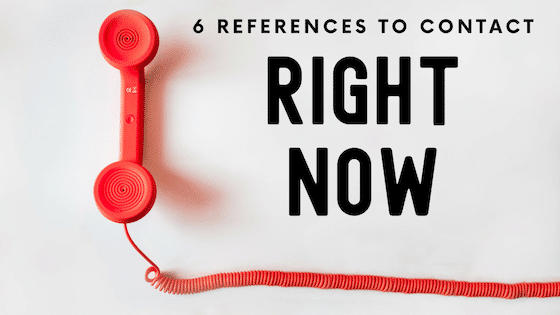References do much more than just proving you showed up to work. Let’s walk through the best references to contact as soon as you start thinking about finding a new job.
By: Daniel Lorenzo | Marketing Manager at Let’s Eat, Grandma
🎵When you need/
A professional reference/
Who you gonna call?!
GHOSTBU— 🎵
No, seriously? Who are you going to call?
Do you know who you’re going to ask to serve as a reference for your upcoming job search?
References are an essential part of the job search process. Hiring managers use references not only to verify your reliability and character, but also to get a complete picture of you.
Your references lend credibility to what you say about your skills and accomplishments. They transform what you’ve written on your resume into 3-D, attesting to what it’s really like to work with you.
So, it’s essential that you choose references who can best represent you, and that you contact them all of them right now. You should have more references than you need ready-to-go for every job you apply for.
(Quick heads-up, though: They don’t need to be on your resume.)
Here are the 6 best references to contact for your upcoming job change:
1. A Direct Supervisor
Contact someone who has directly managed/supervised you.
Why?
This person is a crucial reference because they’re most familiar with your expectations and responsibilities, and can best attest to your measurable performance.
They can prove that you don’t need micromanagement, you’re hard-working, and you’re reliable with deadlines and attendance.
A note: I say “a supervisor” because this doesn’t have to be your current boss! If you’re changing jobs because of a BossZilla (a common reason), it’s doubtful that they’ll give you a great reference.
Just make sure of 2 things:
- You explain the situation with your boss in your cover letter or email. It’s extremely common to look for jobs without letting your current boss know – the company will (at least, they should) understand that.
- One of these following references comes from your current job.
2. A Team Member
Contact a peer with whom you worked on an important project. This person should be someone who’s familiar with your work, not just a work friend.
Why?

Someone you’ve worked with can attest to your valuable soft skills by telling a story about your collaboration, work style, and general personality. (“Josh was very open to feedback and didn’t hold back from sharing his ideas.”)
They can also give remarkably direct evidence of your hard skills with specific details from the project you worked on together. (“Sharon wrote excellent copy tailored for Facebook, Instagram, and our new website that really got the campaign off the ground.”)
3. A Subordinate
Contact someone whom you managed or supervised and maintained a good relationship with.
Why?
If you’re applying to a management position, who better to vouch for you than someone you’ve managed? A subordinate will offer particularly honest feedback about how you handle people. The sheer fact that you have a subordinate you can trust with praising you also lends a lot of cred.
4. A Business Partner
Contact someone from another company whom you closed a deal with, hired for outside help, or collaborated on an effort with.
Why?
They can talk about your performance & professionalism from a valuable outside perspective — outside of the company and outside of your day-to-day life. Your good relationship with them will show how you represent both yourself and the company.
5. A Client
Contact someone you provided awesome service for — especially if you’re applying to a client-facing role.
Why?
Similarly, a client you had a good relationship with will provide an outside perspective. They’ll prove that you deliver while caring about people beyond just results.
6. “The Backup”
Finally, leverage a non-work contact such as a professor, an internship supervisor, or a volunteer experience coordinator as your safety net.
Why?
Life happens. It’s best to have someone on standby in case one of your other professional references falls through or a relationship changes. Though they’re not as preferred as the above contacts, one of these people can prove more about your professionalism and transferable skills than a friend or your mom could.
Why to Contact ASAP
Think through references to contact as soon as you start thinking about changing jobs.
You’ll be given better recommendations from your references if you’ve remained in contact with them leading up to their phone call from an employer. Doing so establishes goodwill and rapport, and reminds them of specific projects and accomplishments from your time together. And of course, they’ll give you a better recommendation if it’s not a surprise.
Make sure you have these 6 references to contact in your corner. Get in touch with your career tribe now, and they’ll vouch for you all the way to your dream job.
So now your references are on lock. What about your resume and cover letter? Schedule a free call now to find out how our business writing experts can get your job search materials in perfect shape.

